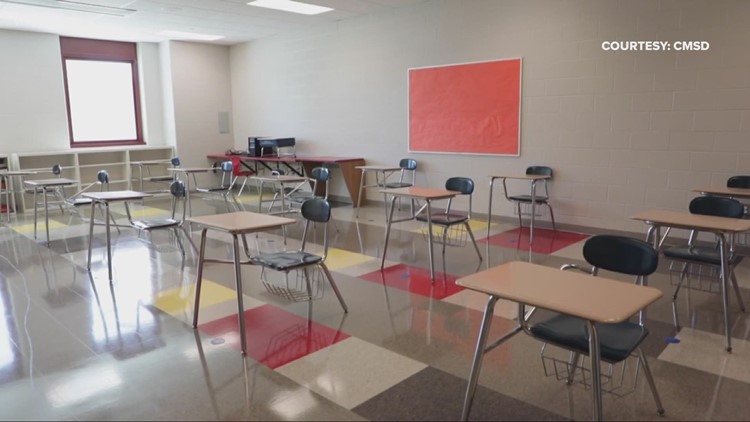Ohio's State Board of Education will still be living lean on a bare-bones budget, but an influx of cash from the state will keep it going through the fiscal year.
The Ohio Controlling Board, which directs appropriations and funding to state agencies, approved a $4.66 million emergency funding request last week for the board of education, to avoid having to raise teacher licensure fees and to cover a $3 million shortfall that may have impacted school staff background checks.
"4.66 (million) is a number that gets us through this fiscal year," State Superintendent of Public Instruction Paul Craft told the Capital Journal. "We're still going to have some tough times."
The controlling board approval was amended from the original request made by the state's Office of Budget and Management, which asked for only $1.85 million after working with the board of education on service sharing and funding cuts to get them through the year.
"We completely were supportive of what OBM was doing," Craft said. "That certainly keeps us where we are right now, which is extremely tight."
The SBOE has been warning of increasing and imminent shortfalls in their funding since they were separated from the Ohio Department of Education and Workforce, and left with only the teacher licensure fund to pay for all operating expenses.
The funding they receive from the licensure fund isn't year-round revenue, causing blocks of time during the year when the board has to sustain itself on very little incoming funds.
"While we continue to strive for operational savings, because the majority of the revenue for this fund is received in the spring, the fund is projected to run a deficit starting this fall and continue until spring, when it will be back in a positive position," the request to the controlling board stated.
The split from the ODEW caused the board to reduce staffing by almost 20%, which included payroll and budget personnel, Craft told the Controlling Board at their Aug. 19 meeting to consider the emergency funds.
"(Payroll and budget) are now being done as shared services through the Office of Budget and Management," Craft said. "None of the money we requested brings back any of those staff."
The SBOE has also reduced board meetings to one day, instituted freezes on travel expenses and out-of-state conference costs. But the emergency funding is still needed to make sure teacher licensure fees can stay at their current rates, and the contract for Retained Applicant Fingerprint Database (RAPBACK) background checks can be paid.
"I'll tell you, I've never seen an agency in my 35 years in state government and military that's running as lean as we are," Craft said. "I'm so proud of what our staff has done in terms of making sure that Ohio's 1.6 million kids interact with educators every day who are well-qualified and who show good moral character and judgment."
Some legislators on the controlling board expressed hesitation in using the funds from the controlling board's "emergency purpose fund," with state Sen. Shane Wilkins, R-Hillsboro, worrying that approving the emergency funds could cause the agency to come back next year for a request of the same amount.
"For me, I would feel better if I knew, 'Hey, we really gave this a shot, the $1.8 (million original request) is not going to cut it,'" he said at the controlling board meeting.
State Sen. Bob Hackett, R-London, questioned the need to push the funds specifically for the background checks, when Craft said the background checks would continue with or without the funding, and with the SBOE in contact with the Ohio Attorney General to find a solution to the funding shortage impacting the background check service.
"It doesn't really change our day-to-day at all," Craft told Hackett and the controlling board. "On the other hand, I've signed (memorandums of understanding) with these agencies, and it would make me sleep better at night knowing that I agreed to these and they're being made whole."
In offering the amendment that raised the funding provided for the SBOE to $4.66 million, state Rep. Jay Edwards, R-Nelsonville, said discussions have been going on for months about a solution to the SBOE funding issues. With the work the SBOE has already done to make cuts, the proposed funding number went from $10 million down to the $4.66 million that was eventually approved. He said it was incumbent upon state leaders make sure the funds were there to hold teacher licensure fees at current levels and maintain background checks.
"The people that have been part of the discussion have heard that we will figure out how to pay for the background checks later," Edwards said. "I don't think it's responsible of the people who hold the purse strings to allow the background checks to be figured out later."
He said the "mistake that was done during the budget … of the transfer to the Department of Education and Workforce," should be corrected, not to mention he didn't want "to be hearing from angry school teachers" if licensure fees increased.
"We're a conservative legislature that is constantly trying to cut taxes and cut fees and cut regulations for people out there," Edwards said. "I don't think teachers are getting rich in our state, I don't want to see us raising teacher licensure fees."
Ohio House Democrats, including controlling board member state Rep. Beryl Brown Piccolantonio, D-Gahanna, said the funding "is a crucial lifeline that staves off a potential 75% increase in mandatory licensure fees."
"I look forward to addressing the remaining SBOE budget uncertainty on a more permanent basis in the next budget," Piccolantonio said in a statement.
Craft said the funding approval now allows the SBOE and the OBM to work together over the course of the fall to put together a plan for next year, as they await the governor's executive budget plan and the state operating budget numbers.
"It's pretty early in the process and we're looking at some other approaches, but this should get us through," Craft told the Capital Journal.
Read more from the Ohio Capital Journal



